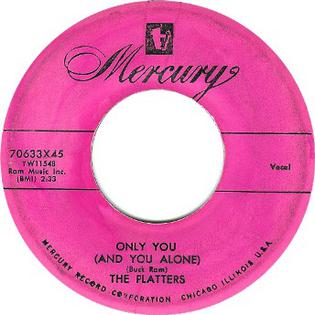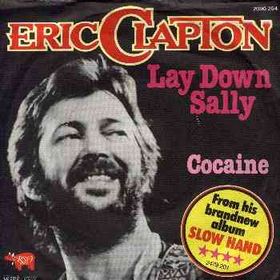Related Research Articles

"Only You (And You Alone)" (often shortened to "Only You") is a pop song composed by Buck Ram. It was originally recorded by The Platters with lead vocals by Tony Williams in 1955.

"I Can't Stop Loving You" is a popular song written and composed by country singer, songwriter, and musician Don Gibson, who first recorded it on December 3, 1957, for RCA Victor Records. It was released in 1958 as the B-side of "Oh, Lonesome Me", becoming a double-sided country hit single. At the time of Gibson's death in 2003, the song had been recorded by more than 700 artists, most notably by Ray Charles, whose recording reached No. 1 on the Billboard chart.

"Runaway" is a number-one Billboard Hot 100 song made famous by Del Shannon in 1961. It was written by Shannon and keyboardist Max Crook, and became a major international hit. It was No. 472 on the 2010 version of Rolling Stone's list of the 500 Greatest Songs of All Time and No. 466 on the 2004 version.
Woodrow Wilson "Red" Sovine was an American country music singer and songwriter associated with truck driving songs, particularly those recited as narratives but set to music. His most noted examples are "Giddyup Go" (1965) and "Teddy Bear" (1976), both of which topped the Billboard Hot Country Songs chart.
"Dream Lover" is a song written by Bobby Darin. Darin recorded his composition on March 5, 1959 and released it as a single the following month. It was produced by Ahmet Ertegun and Jerry Wexler and engineered by Tom Dowd.

"Take Good Care of My Baby" is a song written by Carole King and Gerry Goffin. The song was made famous by Bobby Vee, when it was released in 1961.
"Love Letters in the Sand" is a popular song first published in 1931. The music was written by J. Fred Coots and the lyrics by Nick Kenny and Charles Kenny. Ted Black and His Orchestra, with vocalist Tom Brown, had the first major hit recording of the song in 1931. Pat Boone had a major hit with the song in 1957.
"From a Jack to a King" is a country music song. Originally a crossover hit for artist Ned Miller, who also wrote "Dark Moon", "A Falling Star", and many other country songs. It has been covered extensively by country music artists.
"To Know Him Is to Love Him" is a song written by Phil Spector, inspired by words on his father's tombstone, "To Know Him Was to Love Him." It was first recorded by the only vocal group of which he was a member, the Teddy Bears. Their recording spent three weeks at No. 1 on the Billboard Hot 100 chart in 1958, while reaching No. 2 on the UK's New Musical Express chart. Peter & Gordon and Bobby Vinton later had hits with the song, with its title and lyrics changed to "To Know You Is to Love You". In 1987, the song was resurrected by Dolly Parton, Linda Ronstadt, and Emmylou Harris, whose Trio recording topped the U.S. country singles chart. The song is in 12/8 time.

"Lay Down Sally" is a song performed by Eric Clapton, and written by Clapton, Marcy Levy, and George Terry. It appeared on his November 1977 album Slowhand, and reached No. 3 on the Billboard Hot 100 chart.

"Just One Look" is a song co-written by American R&B singers Doris Troy and Gregory Carroll. The recording by Doris Troy was a hit in 1963. The Hollies, Anne Murray and Linda Ronstadt each achieved great success with the song. There have also been many other versions.

"Six Days on the Road" is an American song written by Earl Green and Muscle Shoals Sound Studio songwriter Carl Montgomery, made famous by country music singer Dave Dudley. The song was initially recorded by Paul Davis and released in 1961 on the Bulletin label. In 1963, the song became a major hit when released by Dudley, peaking at #2 on the Billboard Hot Country Songs chart and cracking the Top 40 (#32) on the Hot 100, leading to it being hailed as the definitive celebration of the American truck driver.

"Roses Are Red (My Love)" is a popular song composed by Al Byron and Paul Evans. It was recorded by Bobby Vinton, backed by Robert Mersey and his Orchestra, in New York City in February 1962, and released in April 1962, and the song was his first hit.
"There! I've Said It Again" is a popular song written and published by Redd Evans and David Mann in 1941. In early 1945, Vaughn Monroe and his Orchestra released Victor 20-1637, which reached the number one position on the Billboard's National Radio Airplay chart for five straight weeks, then no.2 for six more weeks, and a total run of 29 weeks. It finished 1945 as the no. 4 record of the year.

"Why Baby Why" is a country music song co-written and originally recorded by George Jones. Released in late 1955 on Starday Records and produced by Starday co-founder and Jones' manager Pappy Daily, it peaked at 4 on the Billboard country charts that year. It was Jones' first chart single, following several unsuccessful singles released during the prior year on Starday.
"Last Date" is a 1960 instrumental written and performed by Floyd Cramer. It exemplifies the "slip note" style of piano playing that Cramer made popular. It peaked at number 11 on the country chart and at number two on the Hot 100 behind "Are You Lonesome Tonight?" by Elvis Presley. Cramer's recording inspired a number of successful cover versions, including a vocal adaptation by Conway Twitty.
"I Love You Because" is a song written and recorded by country music singer and songwriter Leon Payne in 1949. The song has been covered by several artists throughout the years, including hit cover versions by Al Martino in 1963 and Jim Reeves in 1964.
"My Heart Belongs to Only You" is a song written by Frank Daniels & Dorothy Daniels. Bette McLaurin and June Christy both released versions of the song in 1952. In 1953, the song reached No. 27 on Cash Box's chart of "The Nation's Top 50 Best Selling Records", in a tandem ranking of June Christy, Bette McLaurin, these versions were marked as bestsellers.
"Bless You" is a song released in 1961 by Tony Orlando. The song was written by Barry Mann and Cynthia Weil.
References
- 1 2 "Review Spotlight on... C&W Records", Billboard , May 6, 1957. p. 66. Retrieved February 16, 2018.
- ↑ "Reviews of This Week's Singles", Billboard , May 29, 1961. p. 27. Retrieved February 16, 2018.
- ↑ Lonergan, David F. (2005). Hit Records, 1950-1975 , Scarecrow Press. p. 148. Retrieved February 16, 2018.
- ↑ "Country & Western Records - Best Sellers In Stores", Billboard , December 25, 1961. p. 10. Retrieved February 15, 2018.
- ↑ Neely, Tim; Popoff, Martin (2009). Goldmine Price Guide to 45 RPM Records , Krause Publications. p. 632. Retrieved February 15, 2018.
- ↑ Most Played C&W by Jockeys", Billboard , August 5, 1957. p. 56. Retrieved February 16, 2018.
- ↑ C&W Best Selling in Stores", Billboard , June 10, 1957. p. 58. Retrieved February 16, 2018.
- ↑ Hot 100 - Ray Peterson Missing You Chart History, Billboard.com. Retrieved February 15, 2018.
- ↑ Adult Contemporary - Ray Peterson Missing You Chart History, Billboard.com. Retrieved February 15, 2018.
- ↑ "1050 CHUM - CHUM Charts: Chart No. 230". CHUM. September 4, 1961. Archived from the original on July 21, 2006. Retrieved February 16, 2018.
- ↑ "Chart Toppers", Billboard , December 25, 1961. p. 10. Retrieved February 15, 2018.
- ↑ Jim Reeves Missing You Ad, jim-reeves.com. Retrieved February 16, 2018.
- ↑ "A Touch of Sadness - Jim Reeves". AllMusic . Retrieved February 16, 2018.
- ↑ Hot Country Songs - Jim Reeves Missing You Chart History, Billboard.com. Retrieved February 16, 2018.
- ↑ "Hot Country Singles", Billboard , October 14, 1972. p. 60. Retrieved February 16, 2018.
- ↑ "The Programmers Country Playlist", RPM Weekly , Volume 18, No. 7, September 30, 1972. Retrieved February 16, 2018.
- ↑ Top Country Albums - Jim Reeves Missing You Chart History, Billboard.com. Retrieved February 16, 2018.
- ↑ "Hot Country LP's", Billboard , November 4, 1972. p. 51. Retrieved February 16, 2018.
- ↑ "Hits of the World", Billboard , January 22, 1966. p. 32. Retrieved February 16, 2018.
- ↑ "Let Me Talk to You - Mel Tillis". AllMusic . Retrieved February 16, 2018.